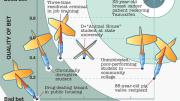The idea seems simple enough: Get detailed information about the participants in a given social program—public-housing residents, say, or applicants for organ transplants. Then, given that we live in a world of limited resources, use that information to remove individuals on whom the program’s resources aren’t well spent, either because the program is unlikely to help them or because they behave in ways that hurt other participants.
Efforts to put that idea into practice in the United States, however, have been far from perfect. Numerous factors—many now ingrained in the programs’ own institutional culture—interfere with the goal of precisely targeting government spending, for example, toward those individuals who stand to gain from it the most. In Targeting in Social Programs: Avoiding Bad Bets, Removing Bad Apples (Brookings Institution Press, 2006), Ramsey professor of political economy Richard Zeckhauser and coauthor Peter Schuck, J.D. ’65, A.M. ’72, a law professor at Yale, propose some remedies.
Consider the U.S. system of allocating kidneys for transplant. Organs that become available go to those who have been on the waiting list the longest—and are consequently the sickest (and therefore the least likely to recover). Although fairness seems to dictate this chronological approach, Zeckhauser and Schuck espouse giving at least some of the kidneys to people further down the list.
Instead of policymaking by anecdote—spending large sums on the most heart rending cases—the authors argue for policymaking by equation. They advance a rational framework for analyzing the benefit to society of a given policy, using quality-adjusted life years (QALYs: a unit of measurement first posited in a 1976 paper cowritten by Zeckhauser). In terms of QALYs, the transplant recipient who lives for decades—work ing, raising children, paying taxes, but perhaps even more important, living in good health and happily—is a better investment than the person for whom a kidney transplant may mean only a few additional years of poor health. Cruel as it may seem, the authors call the people at the top of the kidney waiting list “bad bets”—cases in which the money spent is “wasted” in the sense that it could bestow greater benefit on society if spent elsewhere.
The authors analyze problems in numeric terms, assigning dollar values to lives and plotting people as points on graphs: anyone to the left of a given line is a bad bet, anyone to the right a good bet. The approach may seem cold and impersonal, but the authors argue that it will actually lead to the kindest and most humane outcomes, given that every dollar spent on medical treatment, education, or another social program for one person denies that same dollar to someone else.
Zeckhauser and Schuck also discuss “bad apples” who commit abuse or fraud, or simply behave badly and so detract from a social program’s goal. One example: those who run drug-dealing operations out of their homes in public-housing developments, but arenkicked out—either because of apathetic law enforcement or because the eviction process has so many built-in safeguards for tenants that using it becomes a long and expensive task. Meanwhile, the criminal activity diminishes the other tenants’ quality of life and gives the entire community a bad name, making the general public less likely to support future expenditures for public housing. The authors advise low tolerance for such bad behavior, but also emphasize the importance of an accessible appeals process to protect “good apples” who’ve been excluded in error.
Will policymakers heed this call to action? It wouldn’t be the first time Zeckhauser has been out in front of major policy change. Another Zeckhauser-Schuck collaboration—the 1970 article “An Alternative to the Nixon Income Maintenance Plan”—put forth ideas that, according to Zeckhauser, bear an uncanny resemblance to the Earned Income Tax Credit enacted by the federal government five years later. More recently, The Early Admissions Game: Joining the Elite, which Zeckhauser wrote with Christopher Avery and Andrew Fairbanks, turned a critical eye on colleges’ early-admissions practices (see “Entering the Elite,” May-June 2003, page 15). Three years later, Harvard, Princeton, and other institutions announced plans to eliminate the programs.
The new book’s main premise may not be palatable to those who believe that maligning any beneficiaries of a social program calls the virtue of the entire program into question. For their part, the authors avow repeatedly that they are not questioning such programs’ fundamental value, but instead offering a way to make them affordable—and therefore sustainable—in the face of daunting projections: if current conditions continue, funding for Medicare will be exhausted before 2020, and for Social Security around 2040. “We don’t think of the purpose of this book as just saving resources,” Zeckhauser says. “We think of it as putting resources to their best use. Unless we prioritize correctly, we will lop off some programs that should be preserved.”
~Elizabeth Gudrais





